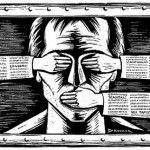Turkey’s War Against the Power of the Pen
“[There is] no difference between the bullets fired in [Kurdish land] and the articles written in Ankara.”
-Turkish Interior Minister Idris Naim Sahin
 The headlines out of Turkey today are dramatic. In what Reuters has called the “Biggest Media Case” ever in Turkey, 44 pro-Kurdish (whatever that means) journalists are on trial for charges of terrorism. Enough journalists are on trial today to create a moderately sized news agency of their own. In fact, the news agencies DIHA News, Özgür Gündem paper and Fırat News Agency were specifically targeted, although the journalists come from a broad range of liberal and Kurdish independent media.
The headlines out of Turkey today are dramatic. In what Reuters has called the “Biggest Media Case” ever in Turkey, 44 pro-Kurdish (whatever that means) journalists are on trial for charges of terrorism. Enough journalists are on trial today to create a moderately sized news agency of their own. In fact, the news agencies DIHA News, Özgür Gündem paper and Fırat News Agency were specifically targeted, although the journalists come from a broad range of liberal and Kurdish independent media.
Reporters Without Borders released a pressing statement related to the trial. “This mass trial recalls darker times that we had hoped were a thing of the past,” Reporters Without Borders said. “Despite all the promises and some marginal improvements, the judicial system is persisting with the serious abuses that we have been condemning for years – criminalization of critical and activist journalism, articles treated as acts of terrorism and systematic abuses of the anti-terrorism law and pre-trial detention.”
Turkey will never advance beyond superficial reforms if its principle tool of intimidation is not completely eradicated. The abuse of the court system through Turkey’s “anti-terror” law means that any reform will always be on the terms of the Turkish state, never truly granting agency and autonomy to its Kurdish citizens.
The oppressions of the Turkish court are three fold in this case. First, they detained journalists unjustly, for writing about such topics as the sexual abuse of minors or daring to interview certain politicians. Secondly, Turkish courts have detained 36 of these journalists without charge since December 2011, and are likely to detain these journalists for many more months as the trial unfolds. Thirdly, the defendants are being denied the right to use their own language in court, a long-standing contention between Kurds and the Turkish state. “Using your mother language is like breathing,” one defendant said. “Should permission be sought when taking a breath?”
Turkey’s actions are clearly denying Kurds of their breath, for without the freedom of expression the Kurdish community in Turkey will never be truly free. A writer from Kurdish Matters summed up the issue best:
“No judicial salvation can be expected from this case, because it is not a legal case, but a political one. So a political solution to the underlying problem is needed to bring the case to an end with the only possible just outcome: the acquittal and release of the journalists.”
As long as Turkey equates the journalist’s pen with the fighter’s bullets, then judicial salvation for these journalists will be far from reach.
Comments
Pingback: Kurdish News Weekly Briefing, 7 – 13 September 2012 « Peace in Kurdistan
Pingback: 44 Kurdish Journalists on Trial in Turkey @Alliance for Kurdish Rights « Kurdish Ally